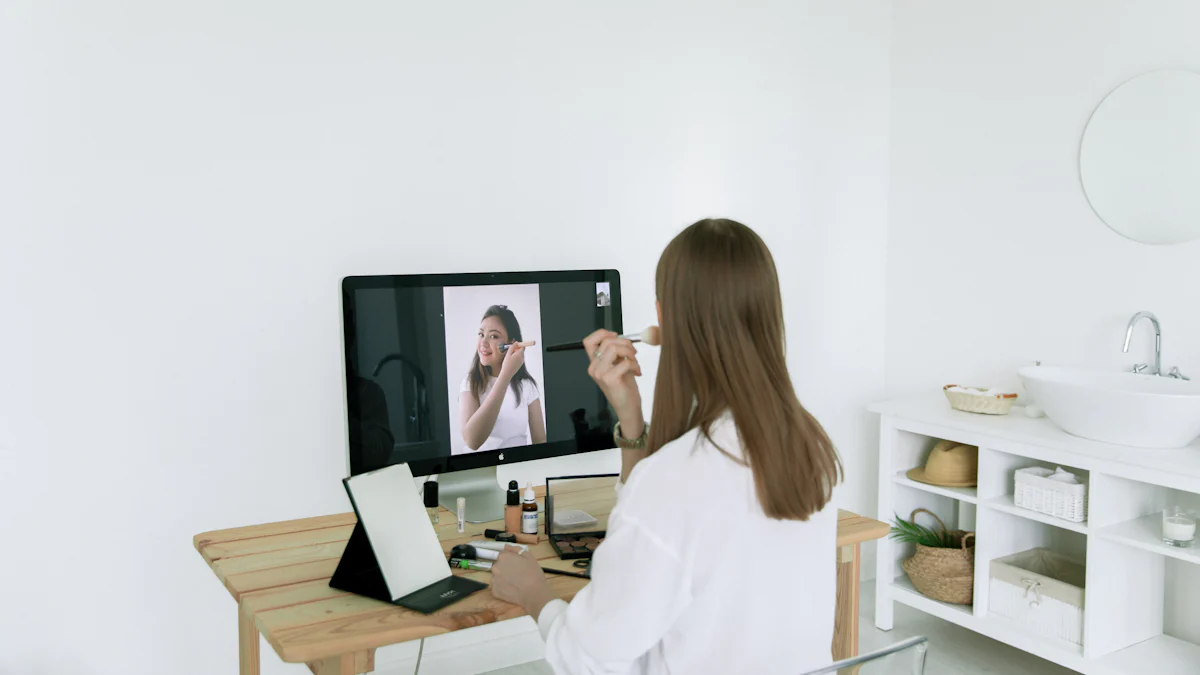Sound Professional on Zoom: Easy Tips

Sound quality plays a crucial role in how to sound professional on Zoom calls. Imagine trying to convey important information, but your voice gets lost in a sea of background noise. It's frustrating, right? Studies show that over 52% of employees struggle to concentrate due to noise pollution. You don't want to be part of that statistic. To sound professional on Zoom calls, you need to focus on enhancing your audio quality. Simple adjustments can make a world of difference, ensuring your voice comes through clearly and confidently.
Key Takeaways
- Invest in quality audio equipment, such as USB or headset microphones, to enhance your sound clarity during Zoom calls.
- Optimize your environment by reducing background noise with soft furnishings and closing windows and doors for a more professional audio experience.
- Position your microphone correctly to capture your voice clearly while minimizing distortion and background noise.
- Adjust Zoom's audio settings, including enabling background noise suppression, to improve your overall sound quality.
- Test your audio setup before meetings using Zoom's built-in test feature to ensure everything is functioning properly.
- Consider using noise cancellation software like Krisp or Gemoo Recorder to further eliminate distractions and enhance your audio clarity.
- Regularly maintain your audio equipment by cleaning it and checking for software updates to ensure optimal performance.
Choosing the Right Equipment

To sound professional on Zoom calls, you need the right equipment. Good audio gear can make a huge difference in how others perceive your professionalism. Let's dive into what you should consider.
Selecting a Microphone
A quality microphone is essential. It captures your voice clearly and reduces background noise. Here are two popular options:
USB Microphones
USB microphones are user-friendly. You just plug them into your computer, and you're ready to go. They offer excellent sound quality and are perfect for home offices. Many professionals prefer USB mics because they deliver clear audio without the need for complex setups.
Headset Microphones
Headset microphones combine headphones and a mic in one device. They are great for blocking out external noise and ensuring your voice comes through clearly. If you move around during calls, a headset mic keeps your audio consistent. Plus, they provide privacy and comfort, making them ideal for long meetings.
Choosing Headphones
Headphones play a crucial role in your Zoom setup. They help you hear others clearly and prevent feedback. Consider these factors when choosing headphones:
Over-Ear vs. In-Ear
Over-ear headphones cover your entire ear. They offer excellent sound isolation and comfort. If you work in a noisy environment, over-ear headphones can help you focus. In-ear headphones, on the other hand, are compact and portable. They fit snugly in your ears and are great for on-the-go use.
Wired vs. Wireless
Wired headphones connect directly to your device. They provide a stable connection and don't require charging. Wireless headphones offer more freedom of movement. They connect via Bluetooth and are perfect if you dislike tangled cords. However, remember to keep them charged to avoid interruptions during calls.
Investing in the right equipment ensures you sound professional on Zoom calls. Whether you choose a USB microphone or a headset, prioritize quality to enhance your audio experience.
Optimizing Your Environment

Creating the right environment is key to sounding professional on Zoom calls. Your surroundings can greatly impact the clarity of your audio. Let's explore some practical ways to optimize your space for better sound quality.
Reducing Background Noise
Background noise can be a major distraction during Zoom calls. You want your voice to be the focus, not the sounds around you. Here are some tips to minimize unwanted noise:
Using Soft Furnishings
Soft furnishings like carpets, curtains, and cushions can absorb sound and reduce echo. They help create a quieter environment by dampening noise. Consider adding a rug to your office or hanging thick curtains. These simple additions can make a big difference in how your voice is heard.
Closing Windows and Doors
Closing windows and doors is a quick way to block out external noise. It keeps out traffic sounds, barking dogs, or any other disturbances from outside. Make it a habit to close them before starting your call. This small step ensures that your voice remains clear and uninterrupted.
Improving Acoustics
Good acoustics enhance your voice's clarity and make you sound more professional. Here are some strategies to improve the acoustics in your space:
Positioning Your Microphone
Positioning your microphone correctly can significantly improve sound quality. Place it close to your mouth but not too close to avoid distortion. A well-positioned microphone captures your voice clearly and reduces background noise. Experiment with different positions to find what works best for you.
Using Acoustic Panels
Acoustic panels are a great investment for improving room acoustics. They absorb sound and prevent it from bouncing around the room. According to Office Principles, using acoustic panels, baffles, and bass traps made of sound-dampening materials is one of the most effective ways to absorb audio. Installing these panels can transform your space into a professional-sounding environment.
By optimizing your environment, you ensure that your voice stands out during Zoom calls. These adjustments help you sound professional and keep your audience focused on what you have to say.
Adjusting Zoom Settings
Fine-tuning your Zoom settings can significantly enhance your audio quality. These adjustments ensure you sound professional on Zoom calls, making your voice clear and engaging. Let's explore how you can optimize these settings.
Configuring Audio Settings
Zoom offers several audio settings that can help you achieve the best sound quality. Here's how you can configure them:
Accessing Audio Settings
First, open Zoom and navigate to the settings menu. You'll find the audio settings under the "Audio" tab. This section allows you to adjust various parameters to suit your needs. Take a moment to familiarize yourself with these options. They hold the key to improving your audio experience.
Enabling Background Noise Suppression
Zoom's noise suppression feature is a game-changer. It filters out unwanted sounds, ensuring your voice remains the focus. You can adjust the noise suppression level based on your environment. For a noisy background, choose the high suppression setting. This setting eliminates most background noise, making your voice stand out. If you're in a quieter space, a lower setting might suffice. Experiment with different levels to find what works best for you.
Testing Your Audio
Before joining a call, it's crucial to test your audio. This step ensures everything is working correctly and helps you avoid any surprises during the meeting.
Using Zoom's Test Feature
Zoom provides a built-in test feature to check your audio setup. Access it through the audio settings menu. This feature lets you hear how you sound and make necessary adjustments. It's a simple yet effective way to ensure your audio is clear and professional.
Adjusting Volume Levels
Volume levels play a vital role in how you sound during calls. Ensure your microphone volume is set to an appropriate level. Too low, and others might struggle to hear you. Too high, and your voice could become distorted. Use the test feature to find the perfect balance. Adjust the volume until your voice is clear and comfortable for listeners.
By adjusting your Zoom settings, you can significantly improve your audio quality. These tweaks help you sound professional on Zoom calls, ensuring your message is heard loud and clear.
Additional Tips and Tricks
Enhancing your Zoom audio doesn't stop with equipment and settings. You can take additional steps to ensure you sound professional on Zoom calls. Let's explore some extra tips and tricks that can elevate your audio experience.
Using Noise Cancellation Software
Noise cancellation software can be a game-changer for your Zoom meetings. These tools help eliminate background noise, ensuring your voice remains clear and focused.
Popular Software Options
Several noise cancellation software options are available to improve your audio quality. Krisp is a popular choice, integrating seamlessly with video conferencing tools to filter out unwanted sounds. Gemoo Recorder is another widely-used app in 2023, distinguishing between human voice and environmental noise. neep's AI-powered noise cancellation offers crystal-clear audio, allowing you to concentrate on your conversation without distractions. Each of these tools provides unique features to enhance your Zoom experience.
Installation and Setup
Installing noise cancellation software is usually straightforward. Most programs offer a simple download and installation process. Once installed, configure the software to work with your Zoom setup. Adjust the settings to suit your environment, ensuring optimal noise reduction. Regularly update the software to benefit from the latest features and improvements.
Maintaining Your Equipment
Proper maintenance of your audio equipment ensures longevity and consistent performance. Here are some tips to keep your gear in top shape.
Regular Cleaning
Regular cleaning prevents dust and debris from affecting your equipment's performance. Use a soft cloth to wipe down your microphone and headphones. Avoid using harsh chemicals that could damage the components. Keeping your gear clean ensures clear audio during your Zoom calls.
Checking for Updates
Stay updated with the latest firmware and software updates for your audio equipment. Manufacturers often release updates to improve performance and fix bugs. Regularly check for updates and install them promptly. This practice ensures your equipment functions optimally, helping you sound professional on Zoom calls.
By incorporating these additional tips and tricks, you can further enhance your Zoom audio quality. Whether using noise cancellation software or maintaining your equipment, these strategies contribute to a professional-sounding experience.
Improving your audio quality on Zoom calls is essential for sounding professional and ensuring clear communication. By choosing the right equipment, optimizing your environment, and adjusting Zoom settings, you can significantly enhance your sound. Don't forget to explore additional tips like using noise cancellation software and maintaining your gear. These strategies not only improve your audio but also boost your confidence during meetings. Apply these tips, and you'll master how to sound professional on Zoom calls, making every interaction more effective and engaging.
FAQ
How can you achieve the best sound quality with Zoom?
To get the best sound quality on Zoom, consider using professional audio equipment. A high-quality microphone and headphones can make a significant difference. They help capture your voice clearly and reduce background noise. Also, ensure your equipment is set up correctly for optimal performance.
What are some common Zoom audio issues and troubleshooting steps?
You might encounter several audio issues during Zoom meetings. Common problems include poor sound quality, echo, or no sound at all. To troubleshoot, start by checking your microphone connection. Make sure it's plugged in properly. Next, adjust your Zoom audio settings to ensure they're configured correctly. Joining a test meeting can also help identify any issues before your actual call.
How do you fix Zoom audio not working issues?
If your Zoom audio isn't working, first check your Zoom audio settings. Ensure your microphone and speaker are selected correctly. If that doesn't solve the problem, download the latest drivers for your device. Updated drivers can fix compatibility issues and improve audio performance.
See Also
Perfecting Your Skills for Effective Hybrid Zoom Meetings
A Comprehensive Guide to Computer Audio Visual Mastery
Key Strategies for Hosting Effective Video Conferences
12 Creative Zoom Backgrounds to Enhance Your Online Meetings
